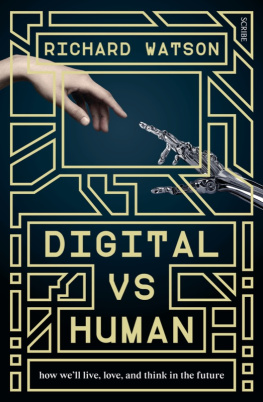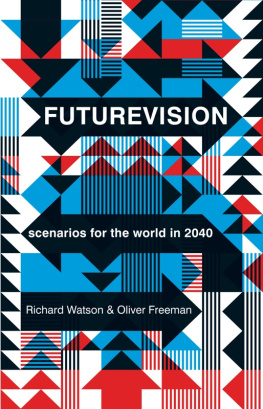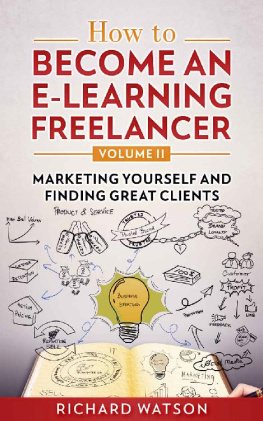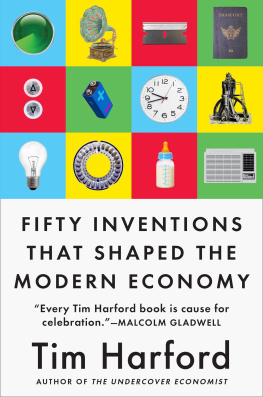
DIGITAL VS HUMAN
Richard Watson works with the Foresight Practice at Imperial College London and regularly lectures at London Business School. He is the author of Future Files , which has been published in 15 languages, and the publisher of Whats Next , an online report that documents new ideas and trends.
www.nowandnext.com
For Anne, aged 89, who found herself swimming against the current
Scribe Publications
1820 Edward St, Brunswick, Victoria 3056, Australia
2 John Street, London, WC1N 2ES, United Kingdom
First published by Scribe 2016
Copyright Richard Watson 2016
All rights reserved. Without limiting the rights under copyright reserved above, no part of this publication may be reproduced, stored in or introduced into a retrieval system, or transmitted, in any form or by any means (electronic, mechanical, photocopying, recording or otherwise) without the prior written permission of the publishers of this book.
The moral right of the author has been asserted.
9781925321173 (Australian edition)
9781925228427 (UK edition)
9781925307283 (e-book)
CiP entries for this title are available from the National Library of Australia and the British Library
scribepublications.com.au
scribepublications.co.uk
The real problem of humanity is the following: we have palaeolithic emotions; medieval institutions; and god-like technology. And it is terrifically dangerous, and it is now approaching a point of crisis overall.
EDWARD O. WILSON
Anything that gets invented after youre thirty is against the natural order of things and the beginning of the end of civilisation as we know it until its been around for about ten years when it gradually turns out to be alright really.
DOUGLAS ADAMS
Qui vivra verra.
(Who lives will see.)
CONTENTS
Preface:
1. : how we came to love our machines more than each other
2. : why instant communication is killing the art of conversation
3. : is it safe to build a parallel universe in your spare bedroom?
4. : is digital cash making us careless?
5. : can we ever acquire immunity against loneliness?
6. : where might self-driving cars eventually take us?
7. : what happens to learning when your teacher is an app?
8. : why the future might look a lot like the Middle Ages
9. : remember when we lived and loved in analog?
10. : the search for (and submission to) something far larger than ourselves
11. : a simple question that hardly anyone is asking
PREFACE
TAMING THE FUTURE
Everybody has a plan until they get punched in the face.
Mike Tyson
The future casts a long shadow in my case, way back to Australia in 2006 when I was asked to write a book called Future Files about where I thought the world was heading over the next 50 years. But the future was always an excuse, used more as a distorting mirror than a crystal ball. What I was interested in then, and remain interested in today, is people and how they respond to new ideas and events.
Also, how we relate and respond to each other , which is what this book is about. It is peoples lives, their deepest dreams, what they believe in, and what they are most afraid of that captivates me, not the latest ephemeral gadget or app, although these things can, and do, influence us, too.
Future Files must have hit a nerve, because the book ended up being published in 15 languages. One reason was timing there hadnt been a book about the distant future for a very long time. But I was also lucky with my thinking. I wrote then that debt levels were unsustainable and that a systemic shock to the financial system was inevitable. This was not a debt mountain; its an avalanche waiting to descend Big banks, in particular, will come under increasing scrutiny about their lending practices, and there will be calls for salary and profit caps
Theres nothing like a page of prophecy to sell some books, although Im still waiting patiently for the European Union to splinter and ultimately collapse, and for the day when women with facial lines will be highly desirable. It seems that I made the mistake of thinking wed tire of forced unions and pixelated perfection, but evidently we havent. Nor have we grown tired of debt in which case, I suspect that history will soon repeat itself, in the form of another major financial crash.
But the main reason the book sold well was due to an emerging epidemic of anxiety and insecurity. The world was changing, and readers were seeking a narrative that explained where things were going. The book provided a comforting cloak of reassurance to those grieving the loss of an imagined future.
The distant future had once been hopeful and at times rather fun. It had been a preview of coming attractions. But by late 2007, people had given up hope of seeing flying cars or owning personal jetpacks. All anyone wanted to know was whether everything would turn out alright. Would there be a comforting resolution after the explosive opening sequence? Would computer-generated special effects continue to enthral us, or would the computer move from all-conquering hero to sinister villain lurking behind our flickering screens?
This dystopian discomfort was likely linked to a feeling that things had got out of control. Events were unfolding too fast for most people to comprehend. Gone were the days when you could start a broken-down car by yourself or understand how a camera worked. Even by 2007, it wasnt just credit default swaps or additionality linked to carbon credits that were baffling you almost needed a degree in complex-systems theory simply to switch on a domestic washing machine. Seriously, do we really need 40-plus washing choices, including the incomprehensible option to wash your clothes later?
Complexity, synonymous in engineering terms with instability, had become a hallmark of the early 21st century, and the worlds axis had shifted towards the outskirts of normal. This was unsettling, especially to anyone brought up in an analog, Western-centric world where globalisation had meant Americanisation and cheap washing machines.
There have always been generational waves of future fatigue. Permit me to restate in full the observation by Douglas Adams:
Everything thats already in the world when youre born is just normal; anything that gets invented between then and before you turn thirty is incredibly exciting and creative; anything that gets invented after youre thirty is against the natural order of things and the beginning of the end of civilisation as we know it until its been around for about ten years when it gradually turns out to be alright really.
Yet this time, the dismay was different. Sometime after the Millennium (probably after the explosive events of 9/11 or, slightly earlier, after the premature death of Douglas Adams), the future became obscured. The dream that we once called the future soured, and its shadow became awkward and indistinct. But even then, this wasnt true for everyone. How one imagines and responds to the future has always depended on who and where you are. The future is always a mental construct generally projected from things that have been recently experienced.
In large parts of Asia and Africa, rapidly rising incomes and opportunities meant that optimism was in the ascendant, while across swathes of the United States and Europe, declining real incomes meant that it was doom and gloom that was often projected forwards. Nevertheless, by 2008 the US financial crisis that had started with people lending and borrowing too much money had become a global problem, creating a vortex into which many age-old certainties were sucked.
Next page







